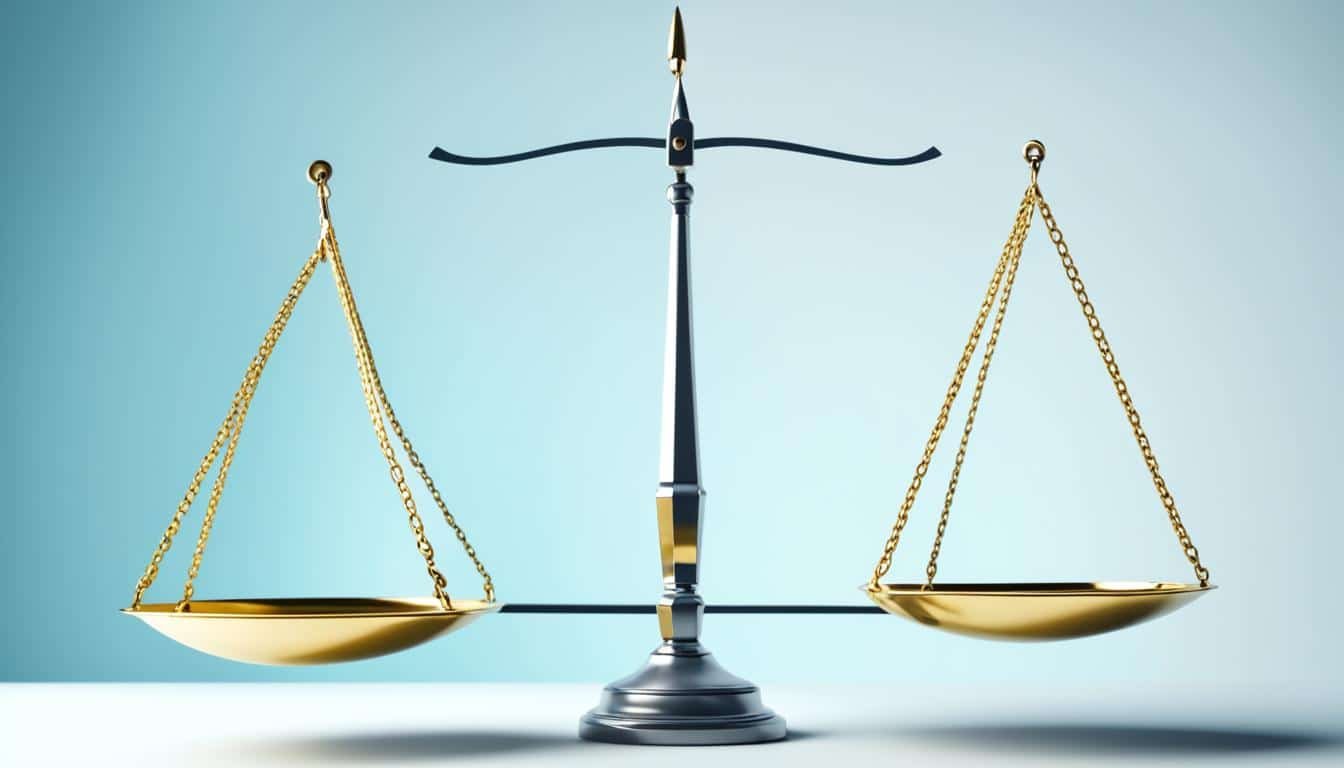What Is An Unsecured Loan?
An unsecured loan doesn’t need collateral like your house or car. Instead, lenders look at your creditworthiness. They might offer you unsecured loans based on your credit score. These loans include things like personal loans, student loans, and credit cards. Because they’re riskier for the lender, they come with higher interest rates. You usually need a strong credit score to get one.
If you can’t pay back the loan, the lender can’t take your stuff. Instead, they may use a collection agency or take you to court. Unsecured loans are great for many needs, like paying personal bills, combining debts, or making your home better.
Key Takeaways
- An unsecured loan does not require collateral, such as a house or car, to be approved.
- Lenders evaluate an applicant’s creditworthiness, including credit score and income, to determine loan approval and terms.
- Unsecured loans typically have higher interest rates than secured loans due to the increased risk for the lender.
- If a borrower defaults on an unsecured loan, the lender cannot seize the borrower’s property, but can take other actions like debt collection or wage garnishment.
- Unsecured loans can be used for a variety of purposes, including personal expenses, debt consolidation, and home improvements.
Definition of Unsecured Loan
An unsecured loan doesn’t need collateral, like a house or car, to get. Lenders look at the borrower’s credit score, income, and outstanding debts to decide. Unlike secured loans, there’s no need to give anything as a backup. With secured loans, the lender could take your stuff if you don’t pay. But with an unsecured loan, they can’t take your things even if you can’t pay. Because of this risk for lenders, unsecured loans have higher interest rates.
Loan Without Collateral
With an unsecured loan, you don’t have to offer anything as backup. Lenders just check your credit score to see if you can get the loan.
Approved Based on Creditworthiness
To get an unsecured loan, lenders see if you’re reliable. They judge your credit score, income, and outstanding debts. This is different from secured loans, which need something valuable from you.
Examples of Unsecured Loans
Unsecured loans come in several types, with personal loans, student loans, and credit cards leading the pack. Each of these has its own pros and cons. For instance, personal loans give you a lump sum for various needs, while student loans help with education costs. Credit cards offer a revolving line of credit for everyday purchases.
Personal Loans
Personal loans are a flexible way to borrow money. They are not secured against an asset. So, how much you can borrow depends on your credit score. This type of loan is often used for big purchases or to consolidate debt. The payback time can vary, from two to seven years, depending on the lender.
Student Loans
Student loans help with the high costs of education. This includes tuition, books, and a place to live. They can be from the government or private companies. Usually, they have lower interest rates but strict rules on who can get them. The payback time starts after you finish school.
Credit Cards
Credit cards are another common unsecured loan. They give you a limit to spend that you can keep using as you pay off what you owe. Unlike personal loans, this amount changes as you pay. But the interest rates can be high. It’s important to manage credit cards smartly to avoid debt.
In the last few years, non-traditional lenders, like peer-to-peer platforms, have become more popular. They use the internet and apps to make borrowing easier and faster. However, not every type of unsecured loan is good. Payday loans and cash advances can trap you in a cycle of debt.
How Unsecured Loans Work
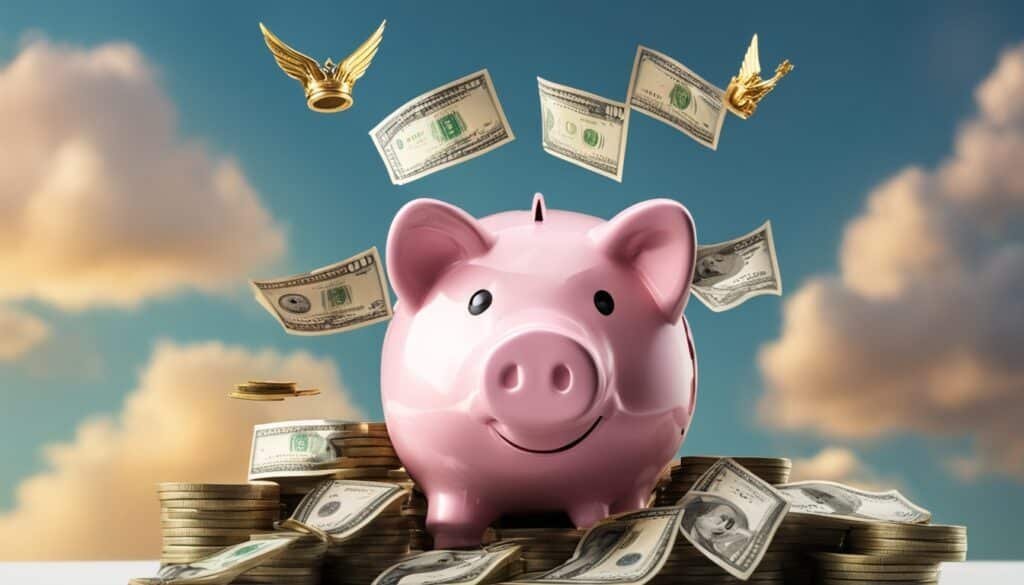
Unsecured loans don’t need any collateral to be approved. They depend only on how trustworthy the borrower is. With unsecured loans, because there’s no collateral, lenders see them as riskier.
For this reason, lenders look for a good credit score before approving them. Borrowers with a credit score over 700 usually get better deals. This means low interest rates on their unsecured loans.
If someone doesn’t pay back their unsecured loan, the lender can’t take their things. So, the interest rates on these loans are often higher than on secured loans.
Besides credit scores, lenders also look at how much someone makes and owes. They also consider the person’s assets. This helps them figure out the best loan deal for the borrower.
Unsecured loans can be paid back in fixed amounts every month. Or, they can be like credit cards, where you can keep borrowing up to a limit.
Unsecured Loan vs. Secured Loan
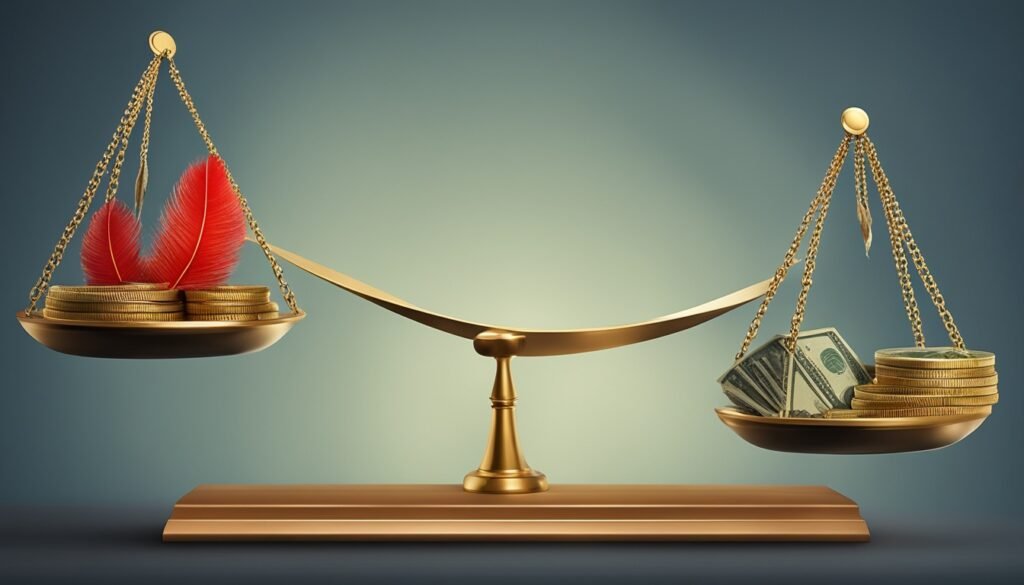
The main difference between an unsecured loan and a secured loan is collateral. Secured loans need a valuable asset as a pledge. This includes mortgages and auto loans. If you don’t pay, the lender can take your asset.
On the other hand, unsecured loans don’t need any collateral. They depend on how good your credit is.
Unsecured loans can be riskier for lenders. So, interest rates may be higher. Borrowers may find it harder to get these loans. Still, the good news is you won’t lose anything if you can’t pay. This makes it less risky for you.
| Feature | Unsecured Loan | Secured Loan |
|---|---|---|
| Collateral Required | No | Yes |
| Lender Risk | Higher | Lower |
| Interest Rates | Higher | Lower |
| Approval Criteria | Based on creditworthiness | Based on collateral and creditworthiness |
| Borrower Risk | Lower | Higher (risk of losing collateral) |
| Examples | Personal Loans, Student Loans, Credit Cards | Mortgages, Home Equity Loans, Car Loans |
To sum up, unsecured loans don’t require collateral. Instead, they look at your credit score. Secured loans, however, need an asset to protect the lender.
This difference affects interest rates and who can get the loan. It also changes the risks for both the lender and the borrower.
Types of Unsecured Loans
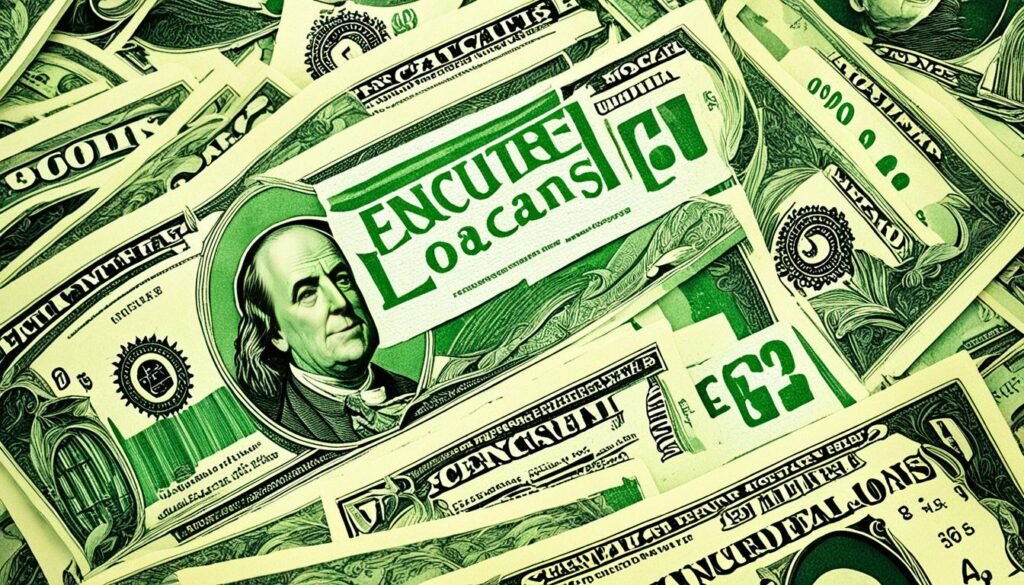
There are two key unsecured loan types: revolving loans and term loans. Each suits different borrowing needs. They come with unique features and benefits.
Revolving Loans
Revolving loans are flexible, like credit cards and lines of credit. They let borrowers use and pay back money within a credit limit. This makes them great for ongoing expenses or to manage cash. The repayment is open-ended, with monthly payments based on what’s owed.
Term Loans
Term loans, on the other hand, provide a one-time fixed sum. This money must be paid back in regular installments over a predetermined time, usually two to seven years. Personal loans and consolidation loans are examples of these. While they offer less flexibility, they usually come with lower interest rates. They’re good for specific goals like debt consolidation or big buys. creditworthiness for unsecured loans, not whether they have collateral . Knowing the differences helps find the best loan for your financial situation.
Unsecured Loan
An unsecured loan doesn’t need you to offer something of value, like a house, to get it. Instead, lenders check if you’re creditworthy. They look at things like your credit score and how much you earn compared to how much you owe. Because there’s more risk for the lender, these loans often have higher interest rates.
If you can’t pay off an unsecured loan, the lender can’t take your house or car. But, they can do other things to get their money back. This includes using a collection agency, taking money straight from your salary, or putting a lien on your house.
Pros and Cons of Unsecured Loans
Unsecured loans have good and bad sides. The big advantage of an unsecured loan is not needing to give collateral like a home or car. This makes the process faster and means the borrower doesn’t risk losing something if they can’t pay back the loan.
Pros
One main advantage of an unsecured loan is that you don’t have to put down collateral. This is great for those without a lot of assets. It also avoids the risk of losing something important if the loan can’t be paid back.
Cons
On the flip side, unsecured loans might come with higher interest rates. This is especially true if you have a bad credit score. If you can’t pay back the loan, it could hurt your credit score or lead to tough actions like collections or wage garnishment.
While unsecured loans can be helpful, it’s smart to think about how they could affect your finances long-term.
Qualifying for an Unsecured Loan
To get an unsecured loan, your credit score and income matter a lot. If you have a credit score above 700, it’s good news. You’ll likely get the loan and at a good interest rate.
Credit Score
Your credit score is key for an unsecured loan. It shows how well you use credit and pay your bills. If your score is high, lenders are more likely to trust you with a loan.
Income and Debt-to-Income Ratio
Lenders also check your income and debt-to-income ratio for the loan. A lower debt-to-income means you can more easily afford the loan. It’s best if it’s under 50%.
Credit History
Your credit history is a must for lenders. They want to see you’ve been good with credit and paying on time. If your history isn’t great, getting the loan is harder. You might need someone to co-sign with you to get it.
Where to Get an Unsecured Loan
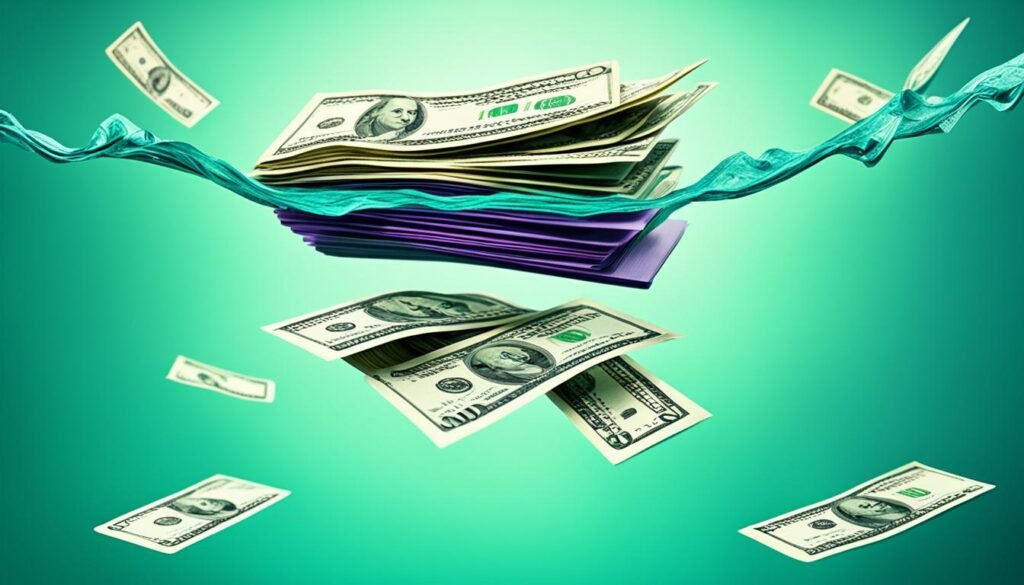
Getting an unsecured loan means having many choices. You can apply online, visit local banks, or even credit unions. Each place has benefits and things to think about. This is true for loans like personal ones, student loans, or any other where you don’t need collateral.
Online Lenders
Today, many people choose online lenders for unsecured loans. They offer quick and easy ways to apply and get approved. Some let you check what loans you might get without affecting your credit score. This is great for people who wonder about their options but are worried their credit might make things tough.
Credit Unions
Credit unions are also a smart pick for some. They usually offer better interest rates and loan terms than many standard banks. But here’s the catch: to get a loan from a credit union, you first need to join them as a member.
Banks
If you’re more into the traditional way, you can look at local banks. They might favor their existing customers by offering more money and lower rates. Yet, getting a loan from a bank means facing a tougher application process compared to online lenders. It’s still a solid choice for many.
No matter where you decide to look for a loan, it’s crucial to do your homework. Be sure to compare everything from interest rates to fees to find a loan that fits your needs. Your goal should be to choose the best loan for you.
Also Read: How Do I Improve My Loan Eligibility?
Conclusion
In conclusion, an unsecured loan doesn’t need any collateral. This makes it easier for people to get. But, to get one, the borrower needs good credit. Lenders check the credit score, income, and debt level.
Unsecured loans let you borrow money fast. You don’t risk losing something like a house or car. But, they often have higher interest rates than secured loans.
It’s smart for borrowers to think hard before getting an unsecured loan. They should make sure they can pay it back on time. With careful planning, an unsecured loan can help reach financial goals.
When deciding on a personal loan, student loan, or credit card, check how it affects your finances. This includes your credit score and interest rate. Think about what happens if you can’t pay back the loan.
Knowing how unsecured loans work is key. Use them wisely to meet financial goals. Stay responsible and keep your financial health strong.
FAQs
Q: What is an unsecured loan?
A: An unsecured loan is a type of loan that is not backed by collateral. This means you don’t have to provide any assets, such as your home or car, as security for the loan.
Q: What are some common features of an unsecured personal loan?
A: Unsecured personal loans typically have higher interest rates compared to secured loans, and they are usually offered in fixed monthly installments.
Q: How can I apply for an unsecured loan?
A: To apply for an unsecured loan, you can contact various lenders directly or use online platforms that allow you to compare loan options and apply online.
Q: Is collateral required for unsecured loans?
A: No, collateral is not required for unsecured loans. Lenders rely on factors such as your credit score and income to determine your eligibility for the loan.
Q: What are some common unsecured loan options available?
A: Some common unsecured loan options include credit card debt consolidation loans, personal loans, and private student loans.
Q: How do I repay an unsecured loan?
A: You can repay an unsecured loan through fixed monthly installments over the life of the loan. It’s important to make timely payments to avoid late fees and negatively impacting your credit score.
Q: Do unsecured loans require a higher credit score?
A: Yes, since unsecured loans are not backed by collateral, lenders typically require a higher credit score to qualify for these types of loans. A good credit score increases your chances of being approved for a loan and may also help you secure a lower interest rate.
Source Links
- https://www.investopedia.com/terms/u/unsecuredloan.asp
- https://www.bankrate.com/loans/personal-loans/unsecured-loans-definition/
- https://www.nerdwallet.com/article/loans/personal-loans/unsecured-personal-loans-no-collateral
